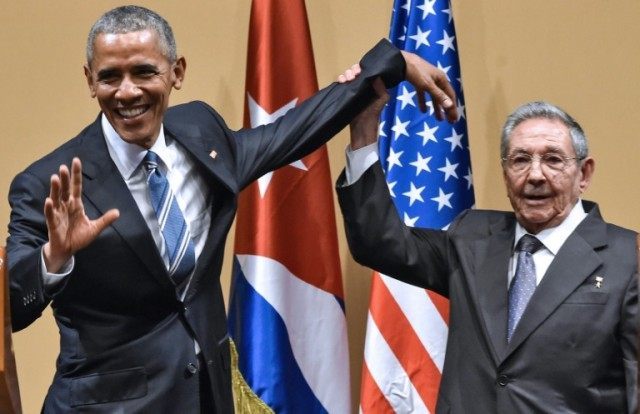President Barack Obama addressed Cubans today, on the final day of his “historic” trip, in an attempt to “bury” the remnants of the Cold War. While thanking the Castros for their hospitality, Obama spoke about the importance of freedom and democracy.
Viewed charitably, his address could inspire a new generation of Cubans to stand up for their rights while repairing relations.
However, there were at least five major problems with Obama’s Cuba address.
1. Context: The Castros have continued their oppression during Obama’s visit. Not only did President Raúl Castro leave Obama hanging at the airport, and criticize America harshly in his presence, but he also arrested political dissidents hours before Obama’s visit. He then denied Cuba has political prisoners at all. Dictators can survive speeches about freedom and democracy; after all, they tell their own people that they believe in the same. What counts, to them, is action — and Obama’s actions effectively endorse the Castros’ continued tyranny in Cuba.
2. Terror: Obama acknowledged the Brussels attacks but once again failed to mention their cause. Obama took about 50 seconds to talk about the horrific terrorism in Belgium, for which ISIS claimed responsibility. But he said nothing, as usual, about “radical Islam” or “Islamic terror.” The omission was more significant than usual, because Cuba was only recently removed from the State Department’s list of state sponsors of terrorism, and the regime still assists terrorist groups such as Iran-backed Hezbollah, which is reported to have opened a base in Cuba.
3. History: Obama criticized America for past actions, from an anti-American perspective. Obama is often keen to show that he can criticize the U.S. as well as any enemy. He said Americans had once come “to liberate but also to exert control over Cuba,” and added: “Before 1959, some Americans saw Cuba as something to exploit: ignored poverty, enabled corruption.” He barely mentioned Cuba’s role in threatening the U.S.. He went on to say: “I know the history, but I refuse to be trapped by it” — as if resentment by the U.S. were the reason for Cuba’s isolation.
4. Narcissism: Once again, Obama made an important political event mostly about himself. Obama cited his own life story as the reason Cuba could trust America: “We do have too much money in American politics, but in America, it’s still possible for somebody like me, a child who was raised by single mom, a child of mixed race who did not have a lot of money to pursue and achieve the highest office in the land.” He diminished his own country, contrasted his own rise with a America beset by problems — as if it was only redeemed when it allowed him to rise.
5. Silence: Obama did not mention the political prisoners and other ongoing forms of oppression. The day before, Castro had promised to release any political prisoners by nightfall if anyone could provide him with a list of them. It was a problem the regime obviously did not keep, and had no intention of keeping. Yet Obama ignored the prisoners, and made no other mention of political dissidents or dissent. As he has throughout this “reconciliation,” he gave the Cuban regime a pass, reassuring the Castros that he was not there “to tear something down.”
Reagan said, “tear down this wall,” and it fell. Obama, by contrast, came to Cuba to offer a conditional surrender.
Joel B. Pollak is Senior Editor-at-Large at Breitbart News. His new e-book, Leadership Secrets of the Kings and Prophets: What the Bible’s Struggles Teach Us About Today, is on sale through Amazon Kindle Direct. Follow him on Twitter at @joelpollak.

COMMENTS
Please let us know if you're having issues with commenting.